Violence in Rakhine State: Deadly attacks in Myanmar kill 89
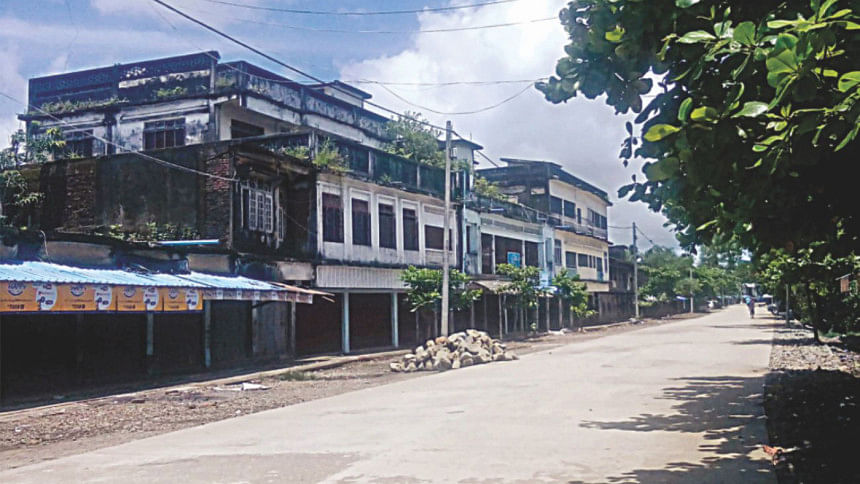
At least 89 people were killed as Rohingya militants besieged border posts in northern Rakhine State of Myanmar yesterday, triggering a fresh exodus of refugees towards Bangladesh.
The office of de-facto leader Aung San Suu Kyi said 12 security officials had been killed alongside 77 militants -- the highest declared single-day toll since fighting broke out last year.
The fighting -- still going on in some areas -- marked a major escalation in a simmering conflict in the northwestern state since last October, when similar attacks prompted a big military sweep beset by allegations of serious human rights abuses.
The offensive encompassed Maungdaw, Buthidaung and Rathedaung townships -- a much wider area compared with October. According to military sources, it involved around 1,000 insurgents.
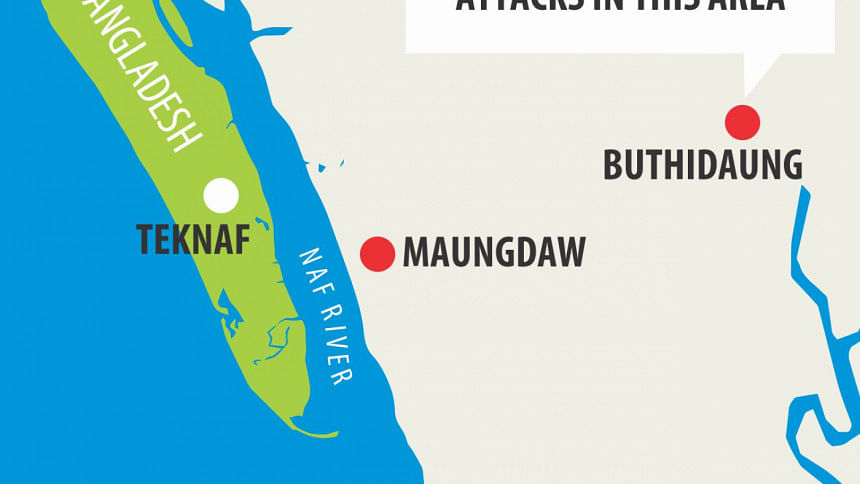
The Arakan Rohingya Salvation Army (ARSA), a group previously known as Harakah al-Yaqin, which instigated the October attacks, claimed responsibility for the early morning offensive, and warned of more.
The treatment of approximately 1.1 million Rohingyas has emerged as majority Buddhist Myanmar's most contentious human rights issue as it makes a transition from decades of harsh military rule. It now appears to have spawned a potent insurgency which has grown in size, observers say.
They worry that the attacks -- much larger and better organised than those in October -- will spark an even more aggressive army response and trigger communal clashes between Muslims and Buddhist ethnic Rakhines.
"In the early morning at 1:00am, the extremist Bengali insurgents started their attack on the police post ... with the man-made bombs and small weapons," said the army in a statement, using the state's description for Rohingya militants.
The militants also used sticks and swords and destroyed bridges with explosives, the army said.
The UN condemned the militant attacks and called for all parties to refrain from violence.
The Rohingyas are denied citizenship and are seen by many in Myanmar as illegal immigrants from Bangladesh, despite claiming roots in the region that go back centuries, with communities marginalised and occasionally subjected to communal violence.
Yesterday's violence pushed new waves of Rohingya to flee towards Bangladesh. But border guards there said they would not be allowed to cross, reports AFP.
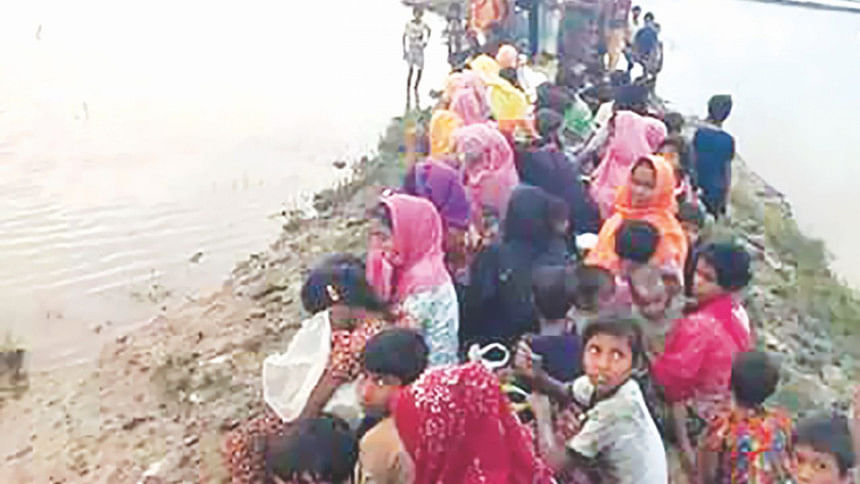
FIRE AND FEAR
The military counter-offensive in October resulted in some 87,000 Rohingya fleeing to Bangladesh, where they joined many others who have fled from Myanmar over the past 25 years.
The UN believes the military crackdown may have amounted to ethnic cleansing of the Rohingya.
But the army and Aung San Suu Kyi's civilian government vehemently deny allegations of widespread abuses, including rapes and murders. They have so far refused to grant visas to UN investigators tasked with probing the allegations.
Amnesty International said there were now fears over how Myanmar's notoriously abusive security forces might respond.
Myanmar security forces have conducted sporadic operations to flush out suspected militants this year, often resulting in casualties among Rohingya villagers.
The Rohingyas have spoken of their fear at being trapped in between security forces and the militants, who are accused of conducting a shadowy assassination campaign against those perceived as collaborators with the state.
Access to the area is severely restricted and verifying information is difficult. And activists and supporters on both sides of the sectarian divide have a history of posting false images and footage online.
The military said yesterday that about 150 Rohingyas attacked an army base in Taung Bazar village in Buthidaung township. Among the police posts attacked was a station in the majority-Rakhine village of Kyauk Pandu, 40km south of the major town of Maungdaw.
Police officer Kyaw Win Tun said the insurgents burned down the post and police had been called to gather at a main station, reports Reuters.
The Irrawaddy news site writes that some 150 men allegedly attacked Infantry Base 552 and an explosive device was used in an attack in Maungdaw, according to the State Counselor's Office.
Another 150 men allegedly attacked a police station at Taung Bazaar at 3:00am and the bodies of six suspected attackers were found, according to a statement on the Facebook page of the Commander-in-Chief Min Aung Hlaing.
A number of ethnic Rakhine Buddhists fled their villages in Taung Bazar and were taking refuge in a monastery, according to a local journalist.
Residents fled fires in Chein Khar Li and Zay Di Pyin villages in Rathedaung yesterday, according to the statement released by the Commander-in-Chief's Office.
Residents were fearful as darkness approached.
"We heard that a lot of Muslim villagers are grouping together, they will make more attacks on us when the sun goes down," said Maung Maung Chay, a Rakhine villager from the hamlet.
"The military and police members are fighting back together against extremist Bengali terrorists," Commander-in-Chief Min Aung Hlaing said in a statement on Facebook.
One resident in Maungdaw, the main town in northern Rakhine, said gunfire could be heard throughout the night.
"We are still hearing gunshots now, we dare not to go out from our house," the resident said by phone, asking not to be named.
Footage obtained by AFP showed smoke rising from Zedipyin village in Rathedaung township where fighting was ongoing yesterday.
The attacks took place hours after a panel led by the former UN chief Kofi Annan advised the government on long-term solutions for the violence-riven state.
Annan condemned the violence yesterday, saying "no cause can justify such brutality and senseless killing".
He denounced the attacks in a statement, calling them a “worrying escalation of violence,” and urged security forces to exercise restraint in dealing with the situation.
Resident Coordinator of the United Nations in Myanmar Renata Lok-Dessallien also released a statement yesterday condemning the attacks and called on all parties to refrain from violence and resolve issues through dialogue.
Both the British and the US embassies also released statements denouncing the attacks, with the US Embassy adding: “We also urge all communities to ensure their rhetoric and their actions contribute to restoration of peace and stability.”
'RUNNING FOR OUR LIVES'
The leader of ARSA, Ata Ullah, has said hundreds of young Rohingya have joined the group, which claims to be waging a legitimate defence against the army and for human rights.
"We have been taking our defensive actions against the Burmese marauding forces in more than 25 different places across the region. More soon!" the group said on Twitter.
Chris Lewa of the Rohingya monitoring group, the Arakan Project, said a major concern was what happened to some 700 Rohingya villagers trapped inside their section of Zay Di Pyin village which had been surrounded by Rakhine vigilantes armed with sticks and swords.
"We are running for our lives," said one of the Zay Di Pyin's Rohingya villagers reached by telephone, adding that houses had been set on fire. The government said the village had been burned down but blamed the fire on the Rohingya.
Amid rising tension over the past few weeks, more than 1,000 new refugees have fled to Bangladesh, where border guards yesterday pushed back 146 people trying to flee the violence, writes AFP.
Mohammed Shafi, who lives in a Rohingya refugee camp in Bangladesh, said his cousin in Myanmar had told him of the trouble.
"The military is everywhere. People are crying, mourning the dead," Shafi said.
"Things are turning real bad. It's scary."

 For all latest news, follow The Daily Star's Google News channel.
For all latest news, follow The Daily Star's Google News channel. 


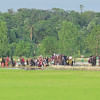


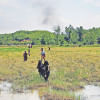


Comments